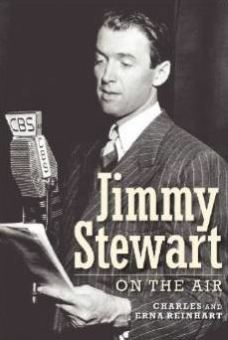Focus on Youth Inc. had its beginnings at Jimmy Stewart’s alma mater, Princeton University, in 1974. Billing itself as “America’s Student Produced Press Conference of the Air,” its executive producer and moderator was Garth R. Ancier. It’s main production was a half-hour weekly program titled Focus on Youth. The syndicated program was heard on more than 300 radio stations and reached an estimated 2.3 million listeners each week at the height of its popularity. According to Ancier, “We try to make the guest look like he is, not something he isn’t. We challenge our guests, but we don’t trap them.” After graduating from Princeton in 1979, Ancier remained in the communication industry where he has been head of programming for the FOX Network, President of Entertainment at NBC, and President and CEO of the Warner Brothers Television Network.
Stewart’s interview was broadcast in two parts on consecutive weeks. Part one went on the air on April 13, 1980, and part two was broadcast on April 20th. Ancier’s producer and main interviewer was Mitch Semel. The associate producer was Seth Lemer and Eric Linder was the director. The show was sponsored by the Shell Oil Company.
Although neither show is in general circulation, both are available at the Paley Center in New York City. We were able to listen to them there.
The April 13th show opens with Ancier reviewing Stewart’s achievements, including his college days, Broadway and Hollywood careers, World War II service and his awards. Mitch Semel then conducts an in-depth interview with Stewart. A summary of the interview questions and Stewart’s answers follows.
First, Semel asks if roles in Broadway plays came easily to Stewart. Stewart replies that there were so many plays on Broadway in those days that it was, in fact, easy to land parts. Semel remarks that in Josh Logan’s recent book (Movie Stars, Real People and Me, Delacorte, 1978), he says that Stewart wanted to be an architect and that he wasn’t really taking his acting seriously. Stewart admits that acting was a “lark” for him at first, but that he found it so exhilarating that he soon became hooked. Next, Mitch asks about the University Players. Stewart tells him that they were a very special and very talented group of actors.
When asked if he had any sense that he would go into acting, Stewart says, “No, not me. Not until that summer after my Princeton graduation.” Semel next asks if there could ever be a repertoire company for film. Although Stewart thinks that it would be a great idea, he doesn’t think that it will ever happen again like the early days of film when it was a great training ground for actors.
Semel asked what it was like to move to Hollywood in the 1930s. Stewart replies that it was a “big bunch of excitement.” Semel asks if filmmaking was still an experimental industry in the ‘30s. Stewart didn’t think that it was, except for the sound part of filmmaking. Soundmen often controlled the films in those days according to him. Semel asks what it was like making the transition from civilian to military life. Stewart relates that he was about 10 years older than all the other recruits and that the officers didn’t really know what to do with him. For several months, he was actually assigned to lead daily calisthenics. When asked if he was ever scared during his missions over Germany, Stewart says, “I was scared all the time.” Was he given special treatment in the military was Semel’s next question. Stewart replied that he couldn’t be “one of the boys” because of his film and famous stature, but that when he started combat training all that changed and everyone became equal.
Semel asks if Stewart’s attitude toward war had changed because of his experiences in World War II. Stewart replied, “No, it didn’t. It was a wonderful experience. It helped me…it broadened me. It helped me to mature in a way that I’ll always be grateful for.” He added that it taught him the importance of duty to country and the importance of transmitting that feeling to others.
Semel’s next question was “Why do you feel many people in our generation don’t have that attitude today?” After a quick, “I can’t answer that question,” Stewart says that he believes there is much more patriotism in the country today than people realize. He also states that he thinks a
lack of discipline has led to a lack of interest in the military. Semel says that President Carter has asked for the responsible use of energy and inquires if the lack of discipline could also play a part in that problem. Stewart seems to be caught off guard by the question and simply responds, “Could be.”
During a commercial break in the program, Ancier for the first time announces that this will be a two-part interview and promotes the fact that next week Stewart will answer questions about the movie industry, Harvey the invisible rabbit and the Academy Awards. The program then ends with one final question for Stewart. Stewart is asked why he thinks the country is not willing to accept rationing the way that they did during World War II. Stewart lays the blame partly at the feet of the Senate and Congress for passing laws that hurt oil production in the United States.
Watch for part two next week.

